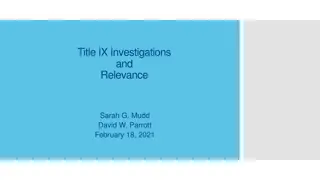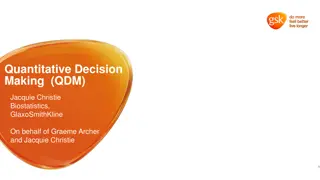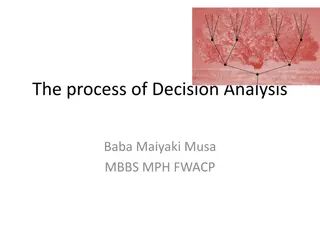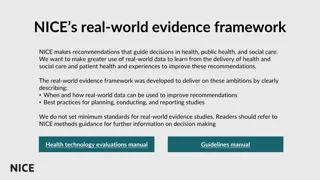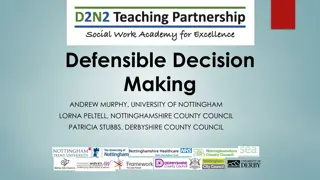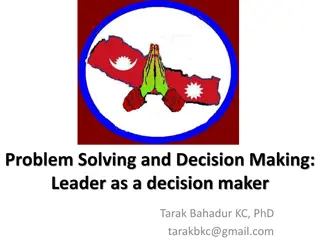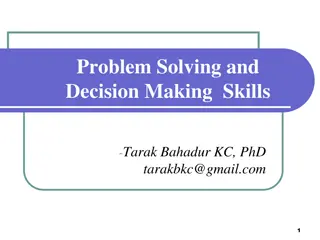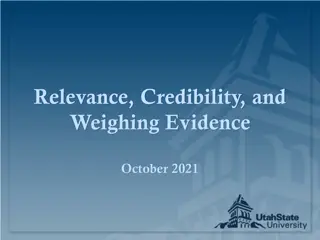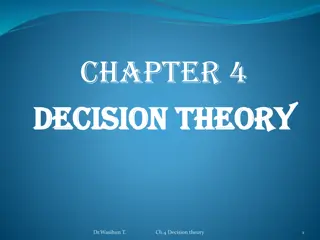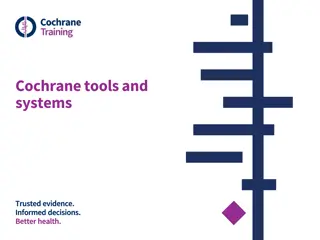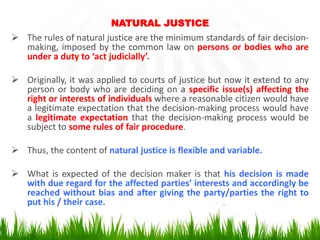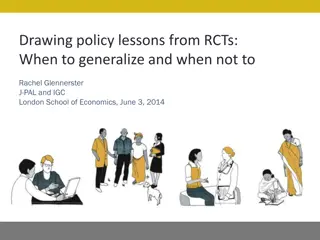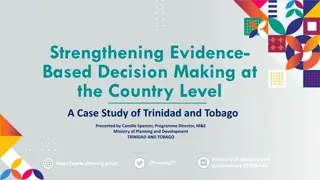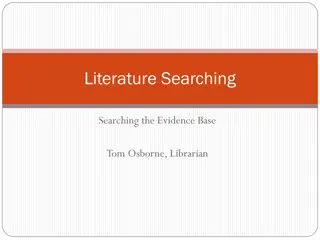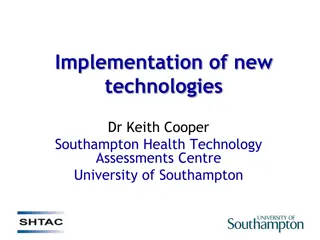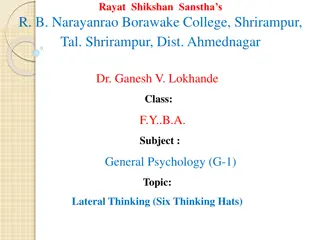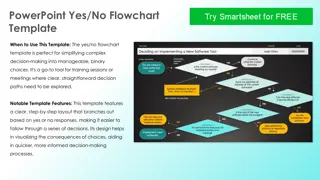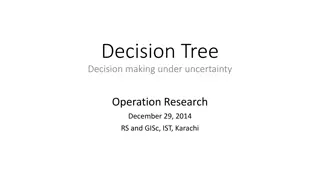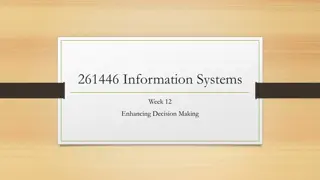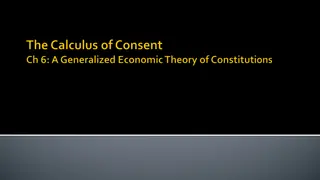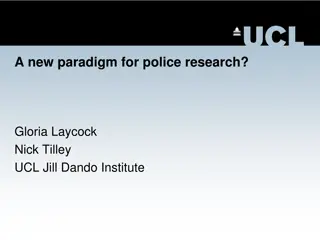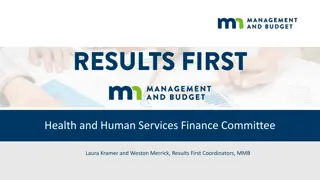Understanding Brain Development and Decision-Making Skills
Explore the fascinating realm of brain development and decision-making skills, focusing on how different brain regions activate during decision-making, the evolution of decision-making abilities from adolescence to adulthood, the importance of practicing decision-making skills, and the influence of
6 views • 10 slides
Illegally obtained evidence
Illegally obtained evidence refers to evidence acquired through unlawful means, such as searches without warrants or extraction under duress. The Fruit of the Poisonous Tree doctrine renders evidence inadmissible if derived from illegally obtained evidence. The Exclusionary Rule prohibits the use of
2 views • 30 slides
Making Informed Decisions in Environmental Science
Values play a crucial role in environmental decision-making. Scientific research is essential in addressing environmental issues, but understanding values is necessary before research can begin. This article discusses how values impact environmental decision-making and introduces an environmental de
0 views • 22 slides
Understanding Title IX Investigations and the Role of Evidence Collection
The purpose of a Title IX investigation is to collect relevant evidence, both inculpatory and exculpatory, to allow for impartial decision-making regarding reported sexual harassment cases. Parties involved must receive sufficient notice and have opportunities to participate, present statements, and
1 views • 32 slides
Enhancing Career Decision Making Process
Explore the importance of good decision-making, types of decision makers, problems faced in decision making, readiness factors for career decisions, decision-making processes, and the CASVE cycle. Understand the significance of effective decision-making skills and how they impact our lives.
0 views • 26 slides
Understanding Quantitative Decision Making in Biostatistics
Quantitative Decision Making (QDM) in biostatistics enables optimal design of development plans and studies, quantifies decision risks, and minimizes bias. It involves setting targets and evidence levels, anchoring outcomes against targets, and establishing evidence thresholds for positive and negat
0 views • 27 slides
Understanding Decision Analysis in Work-related Scenarios
Decision analysis plays a crucial role in work-related decision-making processes, helping in identifying decision makers, exploring potential actions, evaluating outcomes, and considering various values involved in the decision. This module delves into the steps involved in decision analysis, provid
0 views • 76 slides
Enhancing Recommendations with Real-World Data Framework
NICE's real-world evidence framework aims to utilize data from service evaluations, patient devices, and more to enhance recommendations in health and social care. Real-world evidence analysis can provide insights into patient experiences, technology impacts, and care outcomes, improving decision-ma
0 views • 8 slides
Effective Defensible Decision Making in Professional Practice
Explore the concept of defensible decision making in professional practice, encompassing the process, importance of evidence-based decisions, and strategies for justifying and recording decisions to withstand scrutiny. Understand the distinction between defensible decision making and defensive pract
0 views • 20 slides
Comprehensive Guide to Decision Making and Creative Thinking in Management
Explore the rational model of decision-making, ways individuals and groups make compromises, guidelines for effective decision-making and creative thinking, utilizing probability theory and decision trees, advantages of group decision-making, and strategies to overcome creativity barriers. Understan
0 views • 30 slides
Understanding Evidence-Based Medicine and Clinical Decision-Making
European Patients Academy on Therapeutic Innovation emphasizes the importance of Evidence-Based Medicine (EBM) in providing optimum clinical care. EBM involves systematic review and utilization of clinical research for informed decision-making, benefiting patients in disease management and treatment
7 views • 20 slides
Mastering the Art of Decision Making: Problem Solving Strategies
Explore the essence of decision making and problem-solving through a comprehensive session outline. Understand the importance, conditions, styles, processes, and ethical considerations in decision making. Learn how identifying problems, finding solutions, and implementing them are crucial steps in t
0 views • 42 slides
Understanding the Decision-Making Process
Decision-making is the process of selecting the best course of action from multiple alternatives to achieve desired outcomes. It involves identifying decisions, gathering relevant information, and following a step-by-step process to make informed choices. Principles and steps like identifying the de
0 views • 31 slides
Problem Solving and Decision Making Skills Workshop Overview
Workshop on problem-solving and decision-making skills by Dr. Tarak Bahadur KC focuses on defining problems, recognizing reactions, explaining approaches, and identifying practices to improve decision-making ability. The content covers classification of decisions, decision-making processes, practice
0 views • 35 slides
Understanding Relevance, Credibility, and Weighing Evidence in Decision-Making
Explore the importance of relevance and credibility in evidence assessment, the role of hearing panels in evaluating evidence fairly, and the responsibilities they hold. Learn about presenting relevant evidence, policy analysis, and identifying irrelevant evidence to ensure a thorough review process
6 views • 32 slides
Introduction to Decision Theory in Business Environments
Decision theory plays a crucial role in business decision-making under conditions of uncertainty. This chapter explores the key characteristics of decision theory, including alternatives, states of nature, payoffs, degree of certainty, and decision criteria. It also introduces the concept of payoff
0 views • 41 slides
Understanding Decision Trees in Machine Learning with AIMA and WEKA
Decision trees are an essential concept in machine learning, enabling efficient data classification. The provided content discusses decision trees in the context of the AIMA and WEKA libraries, showcasing how to build and train decision tree models using Python. Through a dataset from the UCI Machin
3 views • 19 slides
Group Decision-Making: The Wisdom of Crowds and Stupidity of Herds
This presentation by Richard Zeckhauser of Harvard University delves into the importance of rational analysis and subjective probability in group decision-making processes. It emphasizes the need to focus on collective wisdom while avoiding biases that can affect group decisions. Key concepts covere
2 views • 22 slides
Cochrane Review Ecosystem: Tools for Evidence-Based Decision Making
Explore essential tools and systems like RevMan Web, GRADEpro GDT, and Editorial Manager to support the process of conducting Cochrane Reviews. Learn about accessing RevMan Web, a cloud-based software for systematic reviews, and GRADEpro GDT for creating summary tables. Access free resources for Coc
2 views • 17 slides
Understanding Costs and Revenues for Decision Making
This webinar covers various aspects of cost analysis and revenue calculation essential for decision-making, such as contribution margin, break-even analysis, target profit, contribution to sales ratio, margin of safety, and using break-even analysis in decision-making. Through examples like calculat
1 views • 39 slides
Understanding Biased Assimilation and Attitude Polarization in Social Disputes
People with strong opinions on complex social issues tend to interpret evidence in a biased manner, accepting confirming evidence readily while subjecting disconfirming evidence to critical evaluation. This can lead to increased polarization rather than narrowing of disagreement when exposed to the
0 views • 20 slides
Supported Decision Making as an Alternative to Guardianship
Explore the concept of Supported Decision Making as an alternative to guardianship, addressing the needs of individuals who may require assistance in decision-making. Understand the importance of listening to the incapacitated person, identifying their preferences, choices, and best interests. Learn
4 views • 42 slides
Understanding Natural Justice in Legal Decision-Making
The concept of natural justice sets forth the minimum standards of fair decision-making, applicable to anyone making decisions impacting individual rights. It emphasizes unbiased decision-making, fair procedure, and giving parties a chance to present their case. The duty to act fairly requires decis
0 views • 23 slides
Should Assisted Suicide be Legalized in China? Decision-making with Six Thinking Hats
The content discusses the decision-making process using the Six Thinking Hats method to determine whether assisted suicide should be legalized in China. Various tools and sessions are highlighted, guiding participants through considering different viewpoints, analyzing arguments, and making an infor
0 views • 12 slides
Making Informed Policy Decisions: Lessons from Randomized Controlled Trials
Policy makers face challenges in decision-making without complete evidence. Drawing on a Bayesian approach to evidence, combining different forms of evidence, and considering contextual factors can aid in designing effective policy interventions. Case studies like non-cash incentives for immunizatio
0 views • 18 slides
Strengthening Evidence-Based Decision Making in Trinidad and Tobago
Strengthening evidence-based decision making at the country level is crucial for effective policy design and evaluation. In Trinidad and Tobago, efforts led by Camille Spencer, Programme Director of Monitoring and Evaluation at the Ministry of Planning and Development, focus on enhancing data qualit
0 views • 6 slides
The Assisted Decision-Making (Capacity) Act 2015 in the Criminal Justice Context
The Assisted Decision-Making (Capacity) Act 2015 introduces key reforms such as the abolition of wards of court system for adults, a statutory functional test of capacity, new guiding principles, a three-tier framework for support, and tools for advance planning. It emphasizes functional assessment
0 views • 17 slides
Implementing Group Decision-Making Tools with Voting Procedures at Toulouse E-Democracy Summer School
Decision-making in organizations is crucial, and group decision-making can lead to conflicts due to differing views. Group Decision Support Systems (GDSS) are essential for facilitating decision-making processes. The Toulouse E-Democracy Summer School discusses the implementation of voting tools in
0 views • 21 slides
Effective Literature Searching for Evidence-Based Medicine
Learn about effective literature searching techniques for evidence-based medicine, including library resources, search strategy development, access via OpenAthens, and utilizing the PICO approach for structured searches. Discover how to formulate searches, register for OpenAthens, and navigate libra
0 views • 15 slides
Evidence-Based Decision Making for Health Technology Implementation
The implementation of new technologies in healthcare must be evidence-based and cost-effective. Health Technology Assessment (HTA) plays a crucial role in evaluating the effectiveness, cost, and comparative benefits of various health technologies. Organizations like NICE provide guidance based on cl
0 views • 17 slides
Decision Analysis: Problem Formulation, Decision Making, and Risk Analysis
Decision analysis involves problem formulation, decision making with and without probabilities, risk analysis, and sensitivity analysis. It includes defining decision alternatives, states of nature, and payoffs, creating payoff tables, decision trees, and using different decision-making criteria. Wi
0 views • 27 slides
Practice and Procedure in Judicial Review: Factual Evidence and Interveners
The content provides valuable insights into the practice and procedure regarding factual evidence and interveners in judicial review cases. It covers general rules, recent cases, applications for oral evidence, questioning witnesses, opinion evidence, and the role of interveners. Key points include
0 views • 28 slides
Utilizing Six Thinking Hats for Enhanced Decision Making and Problem Solving
Exploring the concept of Lateral Thinking through the Six Thinking Hats technique, this article delves into how this approach by Edward de Bono can revolutionize decision-making processes. By understanding the objectives and roles of each colored hat - Blue, Red, Yellow, Black, Green, and White - in
0 views • 12 slides
Simplifying Decision-Making with Yes/No Flowchart Template
The Yes/No flowchart template in PowerPoint simplifies complex decision-making by breaking it down into binary choices, making it ideal for training sessions or meetings requiring clear decision paths. Its step-by-step layout visualizes consequences, aiding quicker and informed decision-making. The
0 views • 4 slides
Decision Making Under Uncertainty Using Decision Trees
In this scenario, Colaco faces the decision of whether to conduct a market study for their product, Chocola. The decision involves potential national success or failure outcomes, along with the consequences of a local success or failure from the market study. By utilizing decision trees, this comple
0 views • 7 slides
Enhancing Decision Making with Information Systems
Explore the role of information systems in enhancing decision-making processes within organizations. Topics include business intelligence, types of decisions, decision-making processes, and managerial roles. Learn about structured, unstructured, and semi-structured decisions, different models of man
0 views • 21 slides
Decision Making and Constitutional Rules Behind the Veil of Ignorance
In decision-making for collective actions, individuals behind a veil of ignorance need constitutional rules to govern future decisions. The choice of rules, the expected external costs, and decision-making costs play a crucial role in determining the optimal decision-making rule. By minimizing total
0 views • 16 slides
Role of Research Nurses in Advancing Evidence-Based Practice in Nursing
Research nurses play a crucial role in advancing evidence-based practice in nursing by conducting systematic inquiries to validate existing knowledge, develop new skills, and solve nursing problems. This overview discusses the importance of research in nursing, the significance of evidence-based pra
0 views • 21 slides
New Paradigms in Police Research: Methodological Implications and Future Directions
Policing is evolving towards professionalism and evidence-based practices. However, there is a scarcity of research on effective strategies, highlighting the need for relevant, accessible evidence. The EMIE framework (Effects, Mechanisms, Moderators, Implementation, Economy) aids in assessing eviden
0 views • 22 slides
Results First Initiative Overview: Informing Evidence-Based Decision-Making in Minnesota
The Results First Initiative in Minnesota partners with various stakeholders to identify services offered, anticipate outcomes, and inform decision-making processes by producing evidence-based information. Stakeholders include agencies, counties, providers, and key partners like community groups and
0 views • 28 slides



